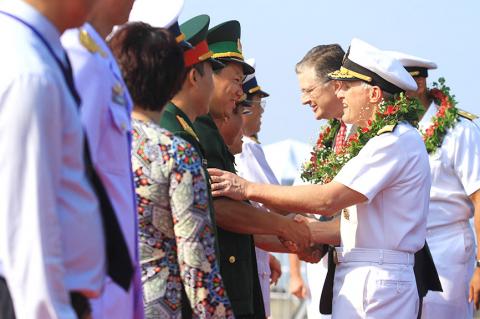For the first time since the Vietnam War, a US Navy aircraft carrier is paying a visit to a Vietnamese port, seeking to bolster both nations’ efforts to stem expansionism by China in the South China Sea.
Yesterday’s visit by the USS Carl Vinson, accompanied by a cruiser and a destroyer, brings more than 6,000 crew members to the central city of Danang, the largest such US military presence in Vietnam since it was unified under communist leadership in 1975.
“The visit of aircraft carrier USS Carl Vinson to Vietnam signifies an increased level of trust between the two former enemies, a strengthened defense relationship between them, and reflects America’s continued naval engagement with the region,” said Le Hong Hiep, a research fellow at the Singapore-based ISEAS-Yusof Ishak Institute.

Photo: AFP
The ships’ mission — a “friendship” visit that includes technical exchanges, sports matches and other community activities, Vietnamese Ministry of Foreign Affairs spokeswoman Le Thi Thu Hang said — marks a fine-tuning, rather than a turning point in relations.
The visit would “continue to promote bilateral relations within the framework of the two countries’ comprehensive partnership and contribute to maintaining peace, stability, security, cooperation and development in the region,” Hang said.
“Although the visit is mainly symbolic and would not be able to change China’s behavior, especially in the South China Sea, it is still necessary in conveying the message that the US will be there to stay,” Hiep said.
“They [Beijing] understand well the strategic rationale behind the rapprochement between Vietnam and the US, which was largely driven by China’s growing assertiveness in the South China Sea,” he said. “However, China also knows that Vietnam is unlikely to side with the US militarily to challenge China.”
Economic relations with the US in recent years have served as a counterbalance to Vietnam’s political affinity with China.
“The United States now is a very important trading partner with Vietnam and it is the most important destination of Vietnam’s exports,” City University of Hong Kong professor of political science Joseph Cheng (鄭宇碩) said.
“In terms of security, both countries certainly share substantial common interest in the containment of China,” he said. “However, it seems that Vietnam does not intend to become an ally of the United States. It is basically a kind of hedging strategy, a kind of balance of power strategy.”
Several Danang residents said that they welcomed the visit.
“During the war, I was scared when I saw American soldiers,” said Tran Thi Luyen, 55, who runs a coffee shop in the city. “Now the aircraft carrier comes with a complete different mission, a mission of peace and promoting economic and military cooperation between the two countries.”

CALL FOR SUPPORT: President William Lai called on lawmakers across party lines to ensure the livelihood of Taiwanese and that national security is protected President William Lai (賴清德) yesterday called for bipartisan support for Taiwan’s investment in self-defense capabilities at the christening and launch of two coast guard vessels at CSBC Corp, Taiwan’s (台灣國際造船) shipyard in Kaohsiung. The Taipei (台北) is the fourth and final ship of the Chiayi-class offshore patrol vessels, and the Siraya (西拉雅) is the Coast Guard Administration’s (CGA) first-ever ocean patrol vessel, the government said. The Taipei is the fourth and final ship of the Chiayi-class offshore patrol vessels with a displacement of about 4,000 tonnes, Lai said. This ship class was ordered as a result of former president Tsai Ing-wen’s (蔡英文) 2018

UKRAINE, NVIDIA: The US leader said the subject of Russia’s war had come up ‘very strongly,’ while Jenson Huang was hoping that the conversation was good Chinese President Xi Jinping (習近平) and US President Donald Trump had differing takes following their meeting in Busan, South Korea, yesterday. Xi said that the two sides should complete follow-up work as soon as possible to deliver tangible results that would provide “peace of mind” to China, the US and the rest of the world, while Trump hailed the “great success” of the talks. The two discussed trade, including a deal to reduce tariffs slapped on China for its role in the fentanyl trade, as well as cooperation in ending the war in Ukraine, among other issues, but they did not mention

HOTEL HIRING: An official said that hoteliers could begin hiring migrant workers next year, but must adhere to a rule requiring a NT$2,000 salary hike for Taiwanese The government is to allow the hospitality industry to recruit mid-level migrant workers for housekeeping and three other lines of work after the Executive Yuan yesterday approved a proposal by the Ministry of Labor. A shortage of workers at hotels and accommodation facilities was discussed at a meeting of the legislature’s Transportation Committee. A 2023 survey conducted by the Tourism Administration found that Taiwan’s lodging industry was short of about 6,600 housekeeping and cleaning workers, the agency said in a report to the committee. The shortage of workers in the industry is being studied, the report said. Hotel and Lodging Division Deputy Director Cheng

‘SECRETS’: While saying China would not attack during his presidency, Donald Trump declined to say how Washington would respond if Beijing were to take military action US President Donald Trump said that China would not take military action against Taiwan while he is president, as the Chinese leaders “know the consequences.” Trump made the statement during an interview on CBS’ 60 Minutes program that aired on Sunday, a few days after his meeting with Chinese President Xi Jinping (習近平) in South Korea. “He [Xi] has openly said, and his people have openly said at meetings, ‘we would never do anything while President Trump is president,’ because they know the consequences,” Trump said in the interview. However, he repeatedly declined to say exactly how Washington would respond in